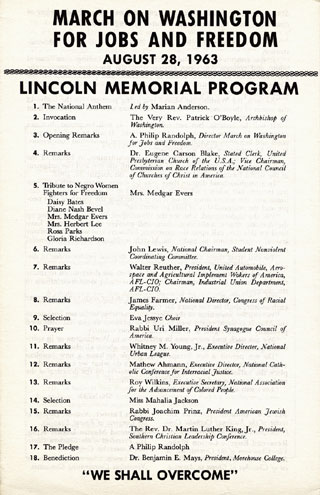
Josephine Baker
Jessica Goldstein of the Washington Post reports, "March on Washington had one female speaker: Josephine Baker" on 23 August
Josephine Baker is perhaps best remembered as a glamorous showgirl in 1920s and ’30s Paris who mothballed her skimpy costumes to serve in the French Resistance before becoming an international superstar. She was also the only woman to speak at the March on Washington.
Wearing her Free French uniform with her Legion of Honor decoration, the 57-year-old Baker had flown in from France, her adopted homeland, for the occasion. She had not been wanted at the event by all of its organizers, several of whom thought the girl from St. Louis had become a woman of France, out of touch with U.S. civil rights issues. But Baker was friendly with the Rev. Martin Luther King Jr., and her managers worked to get her on the program.

Josephine Baker
Baker, who left school in sixth grade, was not entirely comfortable speaking publicly. Her speech relied on simple language, her presentation on her innate charisma.
And yet, there is something enchanting about Baker’s speech, about her oft-repeated life story: a poor, segregated childhood; an escape to France where race relations were years ahead of those in the United States; her adoption of the “Rainbow Tribe,” a social project/family of a dozen ethnically diverse children. She spoke for 20 minutes.

Bennetta Jules-Rosette was 14 when she attended the march with her parents. They moved with the masses down Pennsylvania Avenue on that “scorching hot” August day. “It was so hot,” she remembered. “The heat went through my shoes, up from the asphalt.”
Jules-Rosette, a professor and the director of the African & African-American Studies Research Center at the University of California at San Diego, wrote the biography “Josephine Baker in Art and Life: The Icon and the Image,” in which she quotes from Baker’s speech.

Josephine Baker
“Friends and family,” Baker began. “You know I have lived a long time and I have come a long way. . . .
“I have walked into the palaces of kings and queens and into the houses of presidents. And much more. But I could not walk into a hotel in America and get a cup of coffee, and that made me mad. And when I get mad, you know that I open my big mouth. And then look out, ’cause when Josephine opens her mouth, they hear it all over the world. . . .
“I am not a young woman now, friends. My life is behind me. There is not too much fire burning inside me. And before it goes out, I want you to use what is left to light the fire in you.”
Jules-Rosette recalled how inspired she was by Baker’s words, so much so that she followed Baker’s trajectory, traveled to France and became a dual citizen.

Josephine Baker
Baker wrote to King after the march: “I was so happy to have been united with all of you on our great historical day. I repeat that you are really a great, great leader and if you need me I will always be at your disposition because we have come a long way but still have a way to go.” She signed the Aug. 31 letter, “Your great admirer and sister in battle.”
King replied in November, telling Baker: “We were all inspired by your presence at the March on Washington. I am deeply moved by the fact that you would fly such a long distance to participate in that momentous event. . . . You are certainly doing a most dedicated service for mankind. Your genuine good will, your deep humanitarian concern, and your unswerving devotion to the cause of freedom and human dignity will remain an inspiration to generations yet unborn.”
Baker’s speech, Jules-Rosette said, is the sort of powerful prose that catches you by surprise. “When it’s read out loud, it’s really a performance piece,” she said. “I cry almost every time I hear it.”
(source: Washington Post)
KETC | Living St. Louis | Josephine Baker

No comments:
Post a Comment